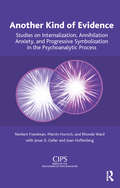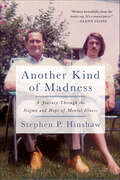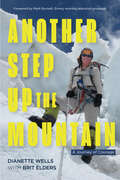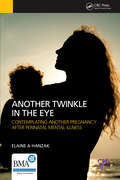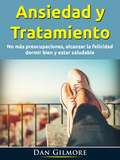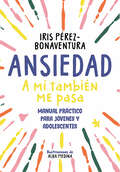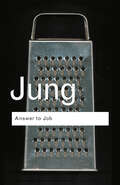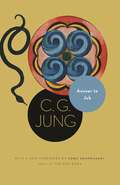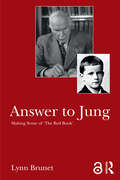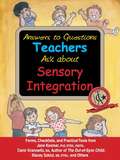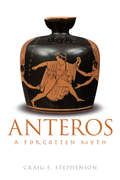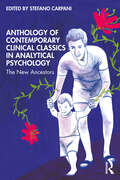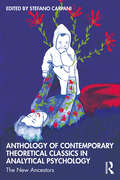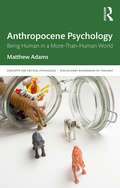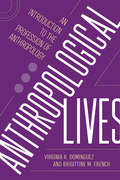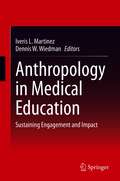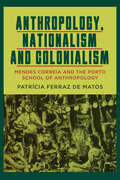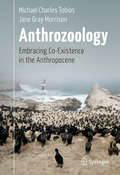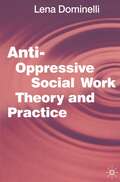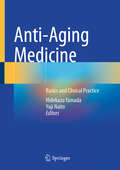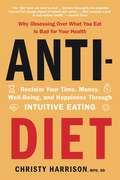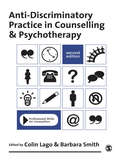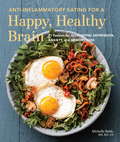- Table View
- List View
Another Kind of Evidence: Studies on Internalization, Annihilation Anxiety, and Progressive Symbolization in the Psychoanalytic Process (CIPS (Confederation of Independent Psychoanalytic Societies) Boundaries of Psychoanalysis)
by Norbert Freedman Jesse D. Geller Joan Hoffenberg Marvin Hurvich Rhonda WardIn our current professional climate, with calls for 'evidenced-based treatment', and in light of the prestige accorded to this emblem, we can ask: for what purpose do we seek evidence? For our students? For the public at large? For an inner sense of feeling supported by science? Most disciplines are concerned with cumulative knowledge, aimed toward self-affirmation and self-definition, that is, establishing a sense of legitimacy. The three parts of this volume are directed toward the goal of affirming a public and private sense of the legitimacy of psychoanalysis, thereby shaping professional identity. In each contribution we adhere to the precepts of 'scientific inquiry', with a commitment to affirming or disconfirming clinical propositions, utilizing consensually agreed upon methods of observation, and arriving at inferences that are persuasive and have the potential to move the field forward. Beyond this, each part of this book describes distinct methodologies that generate evidence pertaining to public health policy, the persuasiveness and integrity of our psychoanalytic concepts, and phenomena encountered in daily clinical practice.
Another Kind of Madness: A Journey Through the Stigma and Hope of Mental Illness
by Stephen P. HinshawWINNER: Best Autobiography/Memoir, 2018 Best Book Awards, sponsored by American Book Fest Glenn Close says: "Another Kind of Madness is one of the best books I’ve read about the cost of stigma and silence in a family touched by mental illness. I was profoundly moved by Stephen Hinshaw’s story, written beautifully, from the inside-out. It’s a masterpiece."A deeply personal memoir calling for an end to the dark shaming of mental illnessFamilies are riddled with untold secrets. But Stephen Hinshaw never imagined that a profound secret was kept under lock and key for 18 years within his family—that his father’s mysterious absences, for months at a time, resulted from serious mental illness and involuntary hospitalizations. From the moment his father revealed the truth, during Hinshaw’s first spring break from college, he knew his life would change forever. Hinshaw calls this revelation his “psychological birth.” After years of experiencing the ups and downs of his father’s illness without knowing it existed, Hinshaw began to piece together the silent, often terrifying history of his father’s life—in great contrast to his father’s presence and love during periods of wellness. This exploration led to larger discoveries about the family saga, to Hinshaw’s correctly diagnosing his father with bipolar disorder, and to his full-fledged career as a clinical and developmental psychologist and professor. In Another Kind of Madness, Hinshaw explores the burden of living in a family “loaded” with mental illness and debunks the stigma behind it. He explains that in today’s society, mental health problems still receive utter castigation—too often resulting in the loss of fundamental rights, including the inability to vote or run for office or automatic relinquishment of child custody. Through a poignant and moving family narrative, interlaced with shocking facts about how America and the world still view mental health conditions well into in the 21st century, Another Kind of Madness is a passionate call to arms regarding the importance of destigmatizing mental illness.
Another Step Up the Mountain: A Journey of Courage
by Brit Elders Dianette WellsA True Story of Triumph Over Adversity and the Loss of a ChildIn this gripping memoir, learn the true story of how mountaineering and extreme sports enthusiast Dianette Wells endures the devastating loss of her son and learns to balance motherhood with a life of extreme adventure.Climbing over adversity. In her groundbreaking memoir, Another Step Up the Mountain, Dianette tells of her unique experiences climbing the Seven Summits, participating in adventure races (including four Eco-Challenges and ultra marathons around the world), as she raised three wonderful children. Trying to survive a tumultuous marriage, Dianette felt empty and unhappy. However, everything changed when she discovered adventure racing. Full of beautiful and uplifting moments, Dianette’s story will inspire you to discover the meaning of joy in your own healing journey.Grief recovery and restoration with every step of the way. In 2015, Dianette lost her son Johnny to a wingsuiting accident, driving her to withdraw into severe depression. However, with the support of those around her, Dianette’s desire to compete in endurance sports and her love of mountain climbing helped her find an inner strength to begin healing. As she had in the past, she faced adversity and found her inner power by embracing her devotion to sports and family. Full of beautiful and uplifting moments, Dianette’s story will inspire you to rediscover what joy means to you and how we must cherish our intrinsic abilities.Inside discover how Dianette:Discovers inner strength amidst adversityBalances motherhood while participating in extreme sportsFinds resilience through mountaineering and ultra marathonsLives with tragic loss with unwavering determinationIf you liked books such as No Summit Out of Sight; Climbing High; Into Thin Air; or Mother, Nature, you’ll love Another Step Up the Mountain.
Another Twinkle in the Eye: Contemplating Another Pregnancy After Perinatal Mental Illness
by Elaine HanzakAnother Twinkle in the Eye is an essential guide for anyone contemplating another pregnancy after perinatal mental illness. The decision to bring a child into the world is rarely one that is taken lightly. When a previous pregnancy and early parenthood has resulted in poor maternal and/or paternal perinatal mental health, making a conscious decision to have another baby can be even more challenging. This unique book provides facts, resources, and discussion points to support people in making informed and comfortable decisions. It is also an essential resource for health professionals who support or are involved in the decision-making process of couples planning another pregnancy. The author combines personal experience with real-life stories from other parents. Also included are contributions from healthcare professionals. The book offers comprehensive coverage across five key areas: Reflection on the previous pregnancy, miscarriage or stillbirth, Decisions to be made when considering another pregnancy, Ways to plan for and to have a healthier experience, The role of healthcare professionals and facilities, and Self-help and complementary techniques for good mental health in the perinatal period.
Ansiedad y Tratamiento: No más preocupaciones, alcanzar la felicidad, dormir bien y estar saludable
by Doug FredrickUna guía detallada para comprender y poner fin a las preocupaciones, el miedo, la depresión y los ataques de pánico. Esta guía representa un valioso aporte para erradicar y lidiar con la ansiedad. Además, le brinda excelentes ejercicios para superar el problema. El uso de medicamentos para combatir el problema da lugar a la aparición de diversos efectos secundarios que pueden causar molestia y no es aconsejable dado que se puede superar el problema de forma natural. Es por eso que esta guía se enfoca en brindarle todos los recursos y métodos naturales para obtener los mejores resultados sin sufrir efectos secundarios. Basado en estudios científicos rigurosamente comprobados, este libro le enseña cómo: - Acabar con el pánico. - Poner un alto al estrés y la ansiedad. - Usar métodos naturales para librarse de preocupaciones, miedos, depresión y ansiedad. - Dormir como una piedra. - Sentirse más saludable y con más energía para disfrutar la vida. - Pensar con más claridad. - Vivir la vida que merece. Si aspira a mejorar como persona, sin llegar a tener preocupaciones, miedo y ansiedad, por más mínimas que sean, este libro es para usted. -> Desplácese hacia la parte superior de la página y haga clic en Agregar al carrito para comprar al instante Aviso legal: El autor y/o propietario(s) de los derechos no pretende, promete ni garantiza que el contenido del presente libro sea exacto, completo o idóneo y rechaza expresamente cualquier responsabilidad por errores u omisiones en el contenido del mismo. Este producto es para uso con fines netamente informativos.
Ansiedad: Una guía para jóvenes y adolescentes con estrategias fáciles y efectivas para enfrentarte a tus miedos
by Iris Pérez BonaventuraUna guía para jóvenes y adolescentes para acompañarlos en sus miedos y ansiedades. Este libro es una guía con estrategias fáciles y eficaces para manejar la ansiedad, los ataques de pánico y el estrés de los jóvenes. Un libro en el que encontrar espacio para reflexionar sobre nuestra salud y equilibrio mental, y al mismo tiempo una herramienta para gestionar la ansiedad, las reacciones de nuestro cuerpo frente a ésta y aprender a hacerle frente.
Answer to Job (Routledge Classics)
by Jung C. G.Of all the books of the Bible few have had more resonance for modern readers than the Book of Job. For a world that has witnessed great horrors, Job's cries of despair and incomprehension are all too recognizable. The visionary psychotherapist Carl Gustav Jung understood this and responded with this remarkable book, in which he set himself face-to-face with 'the unvarnished spectacle of divine savagery and ruthlessness'. Jung perceived in the hidden recesses of the human psyche the cause of a crisis that plagues modern humanity and leaves the individual, like Job, isolated and bewildered in the face of impenetrable fortune. By correlating the transcendental with the unconscious, Jung, writing not as a biblical scholar but 'as a layman and physician who has been privileged to see deeply into the psychic life of many people', offers a way for every reader to come to terms with the divine darkness which confronts each individual.
Answer to Job: (From Vol. 11 of the Collected Works of C. G. Jung) (Jung Extracts #27)
by C. G. JungConsidered one of Jung's most controversial works, Answer to Job also stands as Jung's most extensive commentary on a biblical text. Here, he confronts the story of the man who challenged God, the man who experienced hell on earth and still did not reject his faith. Job's journey parallels Jung's own experience--as reported in The Red Book: Liber Novus--of descending into the depths of his own unconscious, confronting and reconciling the rejected aspects of his soul. This paperback edition of Jung's classic work includes a new foreword by Sonu Shamdasani, Philemon Professor of Jung History at University College London. Described by Shamdasani as "the theology behind The Red Book," Answer to Job examines the symbolic role that theological concepts play in an individual's psychic life.
Answer to Jung: Making Sense of 'The Red Book'
by Lynn BrunetThe Red Book is C.G. Jung’s record of a period of deep penetration into his unconscious mind in a process that he called ‘active imagination’, undertaken during his mid-life period. Answer to Jung: Making Sense of ‘The Red Book’ provides a close reading of this magnificent yet perplexing text and its fascinating images, and demonstrates that the fantasies in The Red Book are not entirely original, but that their plots, characters and symbolism are remarkably similar to some of the higher degree rituals of Continental Freemasonry. It argues that the fantasies may be memories of a series of terrifying initiatory ordeals, possibly undergone in childhood, using altered or spurious versions of these Masonic rites. It then compares these initiatory scenarios with accounts of ritual trauma that have been reported since the 1980s. This is the first full-length study of The Red Book to focus on the fantasies themselves and provide such an external explanation for them. Sonu Shamdasani describes The Red Book as an incomplete task that Jung left to posterity as a ‘message in a bottle’ that would someday come ashore. Answer to Jung brings its message to shore, providing a coherent, but disturbing, interpretation of each of the fantasies and their accompanying images.
Answer to Jung: Making Sense of 'The Red Book'
by Lynn BrunetThe Red Book is C.G. Jung’s record of a period of deep penetration into his unconscious mind in a process that he called ‘active imagination’, undertaken during his mid-life period. Answer to Jung: Making Sense of ‘The Red Book’ provides a close reading of this magnificent yet perplexing text and its fascinating images, and demonstrates that the fantasies in The Red Book are not entirely original, but that their plots, characters and symbolism are remarkably similar to some of the higher degree rituals of Continental Freemasonry. It argues that the fantasies may be memories of a series of terrifying initiatory ordeals, possibly undergone in childhood, using altered or spurious versions of these Masonic rites. It then compares these initiatory scenarios with accounts of ritual trauma that have been reported since the 1980s. This is the first full-length study of The Red Book to focus on the fantasies themselves and provide such an external explanation for them.Sonu Shamdasani describes The Red Book as an incomplete task that Jung left to posterity as a ‘message in a bottle’ that would someday come ashore. Answer to Jung brings its message to shore, providing a coherent, but disturbing, interpretation of each of the fantasies and their accompanying images.Chapters: Chapter 4 of this book is freely available as a downloadable Open Access PDF at http://www.taylorfrancis.com under a Creative Commons [Attribution-Non Commercial-No Derivatives (CC-BY-NC-ND)] 4.0 license.
Answers to Questions Teachers Ask about Sensory Integration
by Jane Koomar Carol Kranowitz Stacey Szklut Lynn Balzer-Martin Elizabeth Haber Deanna Iris SavaIn this elegant approach to the often-elusive subject of sensory integration, the authors have assembled an extensive and easy-to-use set of checklists and other tools that will be invaluable to every teacher and parent who has children with sensory integration challenges.
Anteros: A Forgotten Myth
by Craig E. StephensonAnteros: A Forgotten Myth explores how the myth of Anteros disappears and reappears throughout the centuries, from classical Athens to the present day, and looks at how the myth challenges the work of Freud, Lacan, and Jung, among others. It examines the successive cultural experiences that formed and inform the myth and also how the myth sheds light on individual human experience and the psychoanalytic process. Topics of discussion include: Anteros in the Italian Renaissance, the French Enlightenment and English Modernism psychologizing Anteros: Freud, Lacan, Girard, and Jung three anterotic moments in a consulting room. This book presents an important argument at the boundaries of the disciplines of analytical psychology, psychoanalysis, art history, and mythology. It will therefore be essential reading for all analytical psychologists and psychoanalysts as well as art historians and those with an interest in the meeting of psychoanalytic thought and mythology.
Anthology of Contemporary Clinical Classics in Analytical Psychology: The New Ancestors
by Stefano CarpaniThis anthology of contemporary classics in analytical psychology bring together academic, scholarly and clinical writings by contributors who constitute the "post-Jungian" generation. Carpani brings together important contributions from the Jungian world to establish the "new ancestors" in this field, in order to serve future generations of Jungian analysts, scholars, historians and students. This generation of clinicians and scholars has shaped the contemporary Jungian landscape and their work continues to inspire discussions on key topics including archetypes, race, gender, trauma and complexes. Each contributor has selected a piece of their work which they feel best represents their research and clinical interests, each aiding the expansion of current discussions on Jung and contemporary analytical psychology studies. Spanning two volumes, which are also accessible as standalone books, this essential collection will be of interest to Jungian analysts and therapists, as well as academics and students of Jungian and post-Jungian studies.
Anthology of Contemporary Theoretical Classics in Analytical Psychology: The New Ancestors
by Stefano CarpaniThis anthology of contemporary classics in analytical psychology bring together academic, scholarly and clinical writings by contributors who constitute the "post-Jungian" generation. Carpani brings together important contributions from the Jungian world to establish the "new ancestors" in this field, in order to serve future generations of Jungian analysts, scholars, historians and students. This generation of clinicians and scholars has shaped the contemporary Jungian landscape, and their work continues to inspire discussions on key topics including archetypes, race, gender, trauma and complexes. Each contributor has selected a piece of their work which they feel best represents their research and clinical interests, each aiding the expansion of current discussions on Jung and contemporary analytical psychology studies. Spanning two volumes, which are also accessible as standalone books, this essential collection will be of interest to Jungian analysts and therapists, as well as to academics and students of Jungian and post-Jungian studies.
Anthropocene Psychology: Being Human in a More-than-Human World (Concepts for Critical Psychology)
by Matthew AdamsThis ground-breaking book critically extends the psychological project, seeking to investigate the relations between human and more-than-human worlds against the backdrop of the Anthropocene by emphasising the significance of encounter, interaction and relationships. Interdisciplinary environmental theorist Matthew Adams draws inspiration from a wealth of ideas emerging in human–animal studies, anthrozoology, multi-species ethnography and posthumanism, offering a framing of collective anthropogenic ecological crises to provocatively argue that the Anthropocene is also an invitation – to become conscious of the ways in which human and nonhuman are inextricably connected. Through a series of strange encounters between human and nonhuman worlds, Adams argues for the importance of cultivating attentiveness to the specific and situated ways in which the fates of multiple species are bound together in the Anthropocene. Throughout the book this argument is put into practice, incorporating everything from Pavlov’s dogs, broiler chickens, urban trees, grazing sheep and beached whales, to argue that the Anthropocene can be good to think with, conducive to a seeing ourselves and our place in the world with a renewed sense of connection, responsibility and love. Building on developments in feminist and social theory, anthropology, ecopsychology, environmental psychology, (post)humanities, psychoanalysis and phenomenology, this is fascinating reading for academics and students in the field of critical psychology, environmental psychology, and human–animal studies.
Anthropological Lives: An Introduction to the Profession of Anthropology
by Virginia R Dominguez Brigittine M. FrenchAnthropological Lives introduces readers to what it is like to be a professional anthropologist. It focuses on the work anthropologists do, the passions they have, the way that being an anthropologist affects the kind of life they lead. The book draws heavily on the experiences of twenty anthropologists interviewed by Virginia R. Dominguez and Brigittine M. French, as well as on the experiences of the two coauthors. Many different kinds of anthropologists are represented, and the book makes a point of discussing their commonalities as well as their differences. Some of the anthropologists included work in the academy, some work outside the academy, and some work in institutions like museums. Included are cultural anthropologists, linguistic anthropologists, medical anthropologists, biological anthropologists, practicing anthropologists, and anthropological archaeologists. A fascinating look behind the curtain, the stories in Anthropological Lives will inform anyone who has ever wondered what you do with a degree in anthropology. Anthropologists profiled: Leslie Aiello, Lee Baker, João Biehl, Tom Boellstorff, Jacqueline Comito, Shannon Dawdy, Virginia R. Dominguez, T.J. Ferguson, Brigittine French, Agustín Fuentes, Amy Goldenberg, Mary Gray, Sarah Green, Monica Heller, Douglas Hertzler, Ed Liebow, Mariano Perelman, Jeremy Sabloff, Carolyn Sargent, Marilyn Strathern, Nandini Sundar, Alaka Wali.
Anthropology in Medical Education: Sustaining Engagement and Impact
by Iveris L. Martinez Dennis W. WiedmanThis volume reflects on how anthropologists have engaged in medical education and aims to positively influence the future careers of anthropologists who are currently engaged or are considering a career in medical education. The volume is essential for medical educators, administrators, researchers, and practitioners, those interested in the history of medicine, global health, sociology of health and illness, medical and applied anthropology. For over a century, anthropologists have served in many roles in medical education: teaching, curriculum development, administration, research, and planning. Recent changes in medical education focusing on diversity, social determinants of health, and more humanistic patient-centered care have opened the door for more anthropologists in medical schools. The chapter authors describe various ways in which anthropologists have engaged and are currently involved in training physicians, in various countries, as well as potential new directions in this field. They address critical topics such as: the history of anthropology in medical education; humanism, ethics, and the culture of medicine; interprofessional and collaborative clinical care; incorporating patient perspectives in practice; addressing social determinants of health, health disparities, and cultural competence; anthropological roles in planning and implementation of medical education programs; effective strategies for teaching medical students; comparative analysis of systems of care in Japan, Uganda, France, United Kingdom, Mexico, Canada and throughout the United States; and potential new directions for anthropological engagement with medicine. The volume overall emphasizes the important role of anthropology in educating physicians throughout the world to improve patient care and population health.
Anthropology of the Brain
by Roger Bartra Gusti GouldIn this unique exploration of the mysteries of the human brain, Roger Bartra shows that consciousness is a phenomenon that occurs not only in the mind but also in an external network, a symbolic system. He argues that the symbolic systems created by humans in art, language, in cooking or in dress, are the key to understanding human consciousness. Placing culture at the centre of his analysis, Bartra brings together findings from anthropology and cognitive science and offers an original vision of the continuity between the brain and its symbolic environment. The book is essential reading for neurologists, cognitive scientists and anthropologists alike.
Anthropology, Nationalism and Colonialism: Mendes Correia and the Porto School of Anthropology
by Patrícia Ferraz de MatosA major contribution to the history of European anthropology, this book highlights the Porto School of Anthropology and analyses the work of its main mentor, Mendes Correia (1888-1960). It goes beyond a Portuguese focus to present a wider comparative analysis in which the colonial empire, knowledge of origins, ethnic identity and cultural practices all receive special attention. The analysis takes into account the fact that nationalism, as associated with an ethno-racial paradigm, decisively influenced discourse and scientific and political practices.
Anthrozoology: Embracing Co-Existence in the Anthropocene
by Michael Charles Tobias Jane Gray MorrisonThis groundbreaking work of both theoretical and experiential thought by two leading ecological philosophers and animal liberation scientists ventures into a new frontier of applied ethical anthrozoological studies. Through lean and elegant text, readers will learn that human interconnections with other species and ecosystems are severely endangered precisely because we lack - by our evolutionary self-confidence - the very coherence that is everywhere around us abundantly demonstrated. What our species has deemed to be superior is, according to Tobias and Morrison, the cumulative result of a tragically tenuous argument predicated on the brink of our species' self-destruction, giving rise to a most unique proposition: We either recognize the miracle of other sentient intelligence, sophistication, and genius, or risk enshrining the shortest lived epitaph of any known vertebrate in earth's 4. 1 billion years of life. Tobias and Morrison draw on 45 years of research in fields ranging from ecological anthropology, animal protection and comparative ethics to literature and spirituality - and beyond. They deploy research in animal and plant behavior, biocultural heritage contexts from every continent and they bring to bear a deeply metaphysical array of perspectives that set this book apart from any other. The book departs from most work in such fields as animal rights, ecological aesthetics, comparative ethology or traditional animal and plant behaviorist work, and yet it speaks to readers with an interest in those fields. A deeply provocative book of philosophical premises and hypotheses from two of the world's most influential ecological philosophers, this text is likely to stir uneasiness and debate for many decades to come.
Anti Oppressive Social Work Theory and Practice
by Lena DominelliThis book, by one of the leading theorists of social work, tackles a subject of crucial importance to students and practitioners alike: how social workers can enable their clients to challenge and transcend the manifold oppressions that disempower them (whether through poverty, disability, mental illness, etc. ). It moves from a discussion of social work's purpose and ambitions to an exposition of theory and, from there, to the practice arenas of working with individuals, in groups, within organisations, and within a wider social and political context.
Anti-Aging Medicine: Basics and Clinical Practice
by Hidekazu Yamada Yuji NaitoThis textbook considers aging a disease and summarizes the leading-edge research and fact on anti-aging medicine and the aging mechanism. It provides the basics and biology of aging science, followed by presenting clinical studies such as exercise, nutrition, mental health (brain, sleep), and treatment interventions. The book also discusses aging control and considers behavioral, environmental, and societal implications for healthy aging. The field of aging science is interdisciplinary, and there are much more uncertainties; thus, it is crucial to summarize what is currently known to set a foundation for future research. The International Classification of Diseases by the World Health Organization (WHO) has given the aging-related disease a subcode of XT9T. This trend advanced research of aging-related sicknesses and the concept that infirmities associated with old age can be controlled, such as cancer, dementia, and cardiovascular diseases. Basic research has progressed, and clinical applications have become available, resulting in significant social changes. As increased life expectancy is happening over the globe, we are facing unprecedented challenges, and anti-aging medicine is a key to treating population growth, environmental problems, etc., as problems for the entire planet. Anti-Aging Medicine: Basics and Clinical Practice is an English translation of the publication by the Japanese Society of Anti-Aging Medicine. It is an insightful source for healthcare professionals and scholars in anti-aging and geriatrics. It will attract pharmaceutical, Information Technology, and Artificial Intelligence industries associated with aging-responsive markets. The English translation of this book, originally in Japanese, was facilitated by artificial intelligence. A subsequent human revision of the content was done by the editors and authors.
Anti-Diet: Reclaim Your Time, Money, Well-Being, and Happiness Through Intuitive Eating
by Christy HarrisonReclaim your time, money, health, and happiness from our toxic diet culture with groundbreaking strategies from a registered dietitian, journalist, and host of the "Food Psych" podcast.68 percent of Americans have dieted at some point in their lives. But upwards of 90% of people who intentionally lose weight gain it back within five years. And as many as 66% of people who embark on weight-loss efforts end up gaining more weight than they lost. If dieting is so clearly ineffective, why are we so obsessed with it?The culprit is diet culture, a system of beliefs that equates thinness to health and moral virtue, promotes weight loss as a means of attaining higher status, and demonizes certain ways of eating while elevating others. It's sexist, racist, and classist, yet this way of thinking about food and bodies is so embedded in the fabric of our society that it can be hard to recognize. It masquerades as health, wellness, and fitness, and for some, it is all-consuming. In Anti-Diet, Christy Harrison takes on diet culture and the multi-billion-dollar industries that profit from it, exposing all the ways it robs people of their time, money, health, and happiness. It will turn what you think you know about health and wellness upside down, as Harrison explores the history of diet culture, how it's infiltrated the health and wellness world, how to recognize it in all its sneaky forms, and how letting go of efforts to lose weight or eat "perfectly" actually helps to improve people's health -- no matter their size. Drawing on scientific research, personal experience, and stories from patients and colleagues, Anti-Diet provides a radical alternative to diet culture, and helps readers reclaim their bodies, minds, and lives so they can focus on the things that truly matter.
Anti-Discriminatory Practice in Counselling & Psychotherapy (Professional Skills for Counsellors Series)
by Barbara Smith Mr Colin LagoAnti-Discriminatory Practice in Counselling and Psychotherapy is a groundbreaking text which identifies the ease with which individuals can be disadvantaged merely on the basis of their gender, race, culture, age, sexuality or ability. Examining these and other areas of discrimination, leading experts highlight how vital it is for counsellors, psychotherapists - and others in the helping professions - to be aware of and engage with their own social, political and cultural attitudes, and how they must develop their skills as culturally sensitive, reflective practitioners if counselling is to be truly accessible to all members of society. This substantially revised and updated second edition now also includes chapters on working within an anti-discriminatory approach with: - refugees - people with mental health difficulties - people with disfigurement or visible differences. While each thought-provoking chapter now: - links theory to practice by providing case studies and extracts from therapeutic dialogues - assesses the most recent research findings - provides exercises for enhancing awareness and skills within each different domain or care setting - presents references for further recommended reading. Clearly written and accessible, Anti-discriminatory Practice in Counselling and Psychotherapy is an indispensable addition to the toolkit of everyone either training to be or practising in the counselling and psychotherapeutic professions.
Anti-Inflammatory Eating for a Happy, Healthy Brain: 75 Recipes for Alleviating Depression, Anxiety, and Memory Loss
by Michelle Babb Jeffrey BlandNew from the author of Anti-inflammatory Eating Made Easy, this cookbook shows how to use diet to improve your state of mind. The latest research shows the connection between a healthy gut and a healthy mind. Inflammation markers are frequently found in the blood of people with anxiety and depression, proving a food-mood connection. In this book nutritionist Michelle Babb shows how reducing that inflammation and balancing the flora in the gut results in a healthy mind. Based on the success of her clients, Babb first explains the science behind this eating plan, then delivers 75 tasty recipes that range from simple to easy gourmet that will satisfy your taste buds, your microbiome, and your mood.
